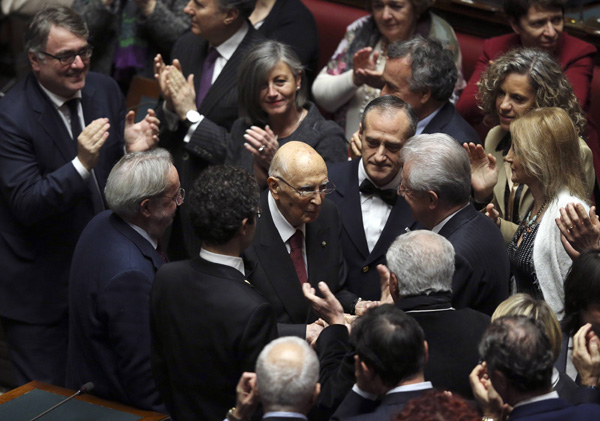 |
|
Outgoing Italian president Giorgio Napolitano (C) acknowledges applause as he arrives at the Chambers of Deputies to begin voting for a new president in Rome January 29, 2015. [Photo/Agencies] |
"I am happy M5S has chosen him. I had the chance to know him, and I have seen he is a balanced, honest, and consistent man," Roberti said.
His hopes for judge Imposimato really winning the presidential race were not high, given that his candidacy was not shared by other major parties. Yet, Roberti knew what president he would want.
"A 'super partes' one, not an arbitrator within politics but a guarantor for country and citizens."
Francesca Barbieri from Rome expressed quite an opposite position. She said she was not around the parliament to follow the voting and not even well informed about it. Yet, she also had a clear mind.
"I want the next president to be a decent person, and an experienced one," she said.
"I don't want the head of State to be partisan of course, but I would like he or she to play a role in the country's major political choices".
The distinction was not at all meaningless.
Italy's president traditionally plays a ceremonial and balancing role in politics, but becomes a key player in times of broad instability and can use his impartial status to help solving major deadlocks, selecting the prime minister and forming cabinets.
More than 500 blank ballots were cast on Thursday and the first vote ended with no result, as most of media and analysts had expected.
A broad two-third majority is in fact required to elect Italy's president in the first three rounds of voting. From the fourth round, which would likely take place on Saturday, a simple majority will suffice.
PM Renzi has numbers enough to elect his candidate Mattarella on the fourth round, in principle, but this step might have consequences.
Considering that a pact on institutional reforms was struck by Renzi and Berlusconi in early 2014, a major breach between them over the presidential election would put in jeopardy both the reform path and PM Renzi's plan to bring his cabinet to its natural end in 2018.
 When it comes to Africa, China's inroads are just getting started
When it comes to Africa, China's inroads are just getting started
When it comes to Africa, China's inroads are just getting started
